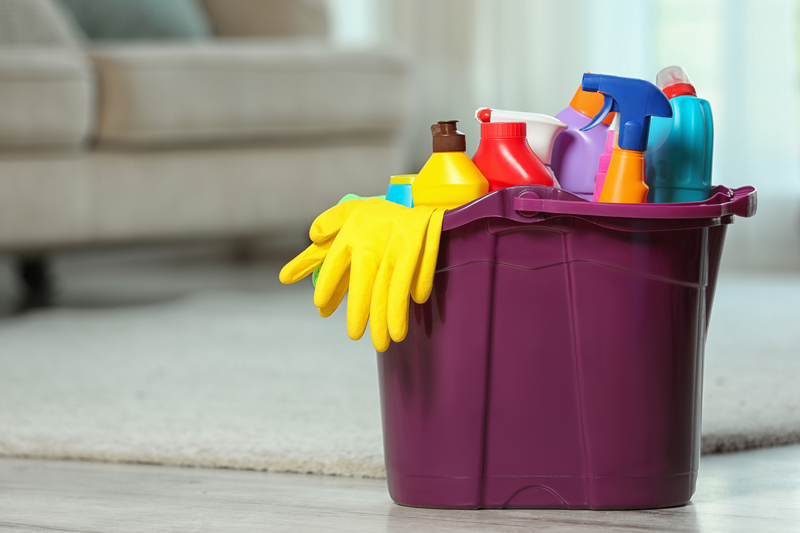
by Mrs C | Jan 31, 2022 | Blog
Children are very curious and sometimes their curiosity can lead to harm. Whether you’re cleaning your house or simply storing your cleaning supplies, there are some cleaners that you need to make absolutely certain kids can’t get access to. Keeping these cleaning products away from children can help to keep them safe.
Bleach
On its own, bleach is a dangerous chemical. When in contact with skin, it can cause minor burns and when ingested it can cause some severe symptoms, including vomiting and internal bleeding, and it can even cause death. However, the most dangerous thing about bleach is it can be far more hazardous when combined with other chemicals. Even something as harmless as vinegar can turn bleach into chlorine gas and can cause serious respiratory issues and even damage to the nervous system. When bleach is in your household, you need to make an extra effort to keep it out of reach of children and stored safely.
Drain Cleaners
No matter how careful you are, everyone needs to thoroughly clean out their drain once in a while. Chemical cleaners can clear your drain when a plunger doesn’t do the job. These cleaners are very powerful and can get rid of nearly any clog in your drains. If they are powerful enough to do this, they also have the potential for serious harm. Many drain cleaners contain chemicals such as ammonia, lye, and sulfuric acid. These chemicals can lead to symptoms such as vomiting, respiratory problems, burns, and even death. Make sure these cleaners are kept safely away from children.
Laundry and Dish Detergent
Children are drawn to anything colorful, which often includes many laundry and dish detergents. However, these chemicals can be very dangerous for children. Many dish detergents are made with bleach or chlorine and these can cause very serious symptoms and even death. When it comes to laundry detergent, you especially want to be cautious of laundry pods. These pods can look like treats to little kids, but they have been known to cause death if ingested. While storing laundry detergent is essential, you also want to take other measures to keep the laundry room safe for kids.
There are many chemicals needed to keep your home clean. Unfortunately, these chemicals can pose a serious threat to children. It’s important to be aware of the dangers of these chemicals and to take measures to store them safely.
Check out this article on 3 challenges of raising a family in the U.S!

by Mrs C | Jan 31, 2022 | Blog
Most Americans do not have an emergency fund. This can leave you in a desperate place if anything does happen to you or a family member. Saving money protects you and your family, no matter what. Principles that will help you save more money include being, long-term savings, and tracking your spending.
Be Frugal, Not Cheap
Many use the terms frugal and cheap interchangeably, but the perception of the two words in action make a big difference. Cheap refers to cost while frugal focuses on value. When you are cheap, the price is more important than the value. However, this often means that you buy cheap products that you must replace frequently. This can end up costing you more money in the long run. Frugality is choosing which items are necessary for daily life and investing in a product that will have high enough quality to bring you value. Choose to be frugal and let your purchased products pay for themselves.
Think About Long-Term Savings
When purchasing products, it is important to think about long-term savings. It is not always wise to look at the initial cost and choose the cheaper product. If there is a higher quality product that will last longer, it may end up being cheaper long-term. You must determine if the life of the product will be worth the cost. For example, performing home maintenance can be done with a minimal budget, but often the materials used need to be replaced quickly. A metal roof may cost you $2,000 more, but you’ll see more savings over the long-term. Investing in high quality products will bring you bigger savings long term.
Track Your Spending
Tracking your spending is one of the easiest ways to see where your money is going. When you know where the money is going, you will have an easier time determining whether purchases are necessary or not. If you are new to tracking, start by writing down each of your purchases. Develop a system that keeps track of expenses in each category. Use these tools to keep you honest with your budget and financial goals. When you track spending, you are better at budgeting your money and controlling the flow of it.
Financial goals are personal. Achieving those goals and good financial health depend on your ability to save money. Follow principles that will help you save more money long-term to reach your financial goals.
Want to save more money? Check out this article on saving while shopping for clothes!

by Mrs C | Jan 26, 2022 | Blog
When you want the best for your family, you need to be setting goals that will help you all to move forward. Doing that will put you in a great position to be financially stable and help your family members when they need it. Sometimes it can be difficult to know what goals your family should have in place. Below are a few good long-term goals that your family can start working towards today.
College
One of your main goals should be saving so your children can have a positive college experience. You can decide what amount you want to have for your children’s college funds, but you want to start working on this goal as soon as possible. Education costs are rising while it is getting more and more important that you have an education. By saving money each month for your child’s education, you can help your children to achieve their dreams and live comfortably when they are adults.
A Home
Buying a home is another important goal that you should be working towards with your family. Saving up for a down payment can be a good starting point, but you also want to make sure that you are working on your credit scores as well. Paying down debt and staying on top of your bills can all help to make that happen for you and your family. If you have poorer credit, you’ll likely need a 20% down payment on a home. Starting early will help you to get the things you need to buy a home you love.
A Security Blanket
You never know what life will throw your way, and you want to make sure you are prepared in case something bad happens. Having a savings security blanket can help to protect your family if you run into unexpected trouble. A good place to start is simply by having enough savings in your account to pay for 3 months of expenses. From there you can continue saving so you and your family can handle anything that you have to deal with over the course of your life.
As you start working towards a stronger financial future for your family, you will grow closer together. With good planning you and your family can deal with any challenge. And you can show each other your love by working together towards your goals.
Check out this article on home items you can get at a thrift store!

by Mrs C | Jan 26, 2022 | Blog
Have you ever noticed that your electricity bill skyrockets in the hottest and coldest months of the year? If so, it is probably because you are overusing your HVAC system in an effort to maintain an ideal temperature in your home. Here are a few ways that can help you to save money when you’re heating or cooling your home in the winter or summer.
Improve Your Insulation
One way to reduce your electricity bill during the cold months is to improve your home’s insulation. If your home doesn’t have good insulation, it means that your warm, heated, indoor air can more easily escape your home’s interior. As a result, you’ll have to turn up the heat inside to compensate for the cold air seeping in and warm air escaping. This will cause your electricity bill to rise. By making sure that your home is properly insulated, you’ll be able to more easily maintain an ideal temperature inside without overworking your HVAC system.
Keep Your Units Maintained
Another way to save money when heating or cooling your home is to keep up with your unit maintenance. All HVAC units require maintenance from time to time. Especially if you live in an area that requires you to use your HVAC system quite often during the winter or summer, your units are likely to require a bit of attention and maintenance every year. This will help them to run properly and more efficiently.
Heat According to Your Needs
Finally, remember to heat your home according to your needs. Of course, it can be easy to turn on your heating and forget about it, but it could actually save you a lot of money if you’re more conscious of when you actually need to use your heating system. For example, if you’re going to be away from home for a few hours, turn off the heat. When you’re getting ready for bed, turn the heat down a bit and throw on an extra layer or use an extra blanket. Remember to close the doors to unused rooms so the temperature is more easily maintained in the space that you’re using. This type of awareness will help prevent super high electricity bills.
Remember, if you’re concerned about expensive electricity bills, try to improve your home’s insulation, maintain your units, and heat according to your needs for a less expensive result. Of course, there are also a few other ways that can help you to lower your HVAC use, so take the time to research additional options as well. If you act more consciously so you can lower your electricity bill, you’ll be able to stay more comfortable, and you’ll be happier with the financial result.
Check out this article on how you can save money on home repairs!

by Mrs C | Jan 24, 2022 | Blog
To rent or buy? That is the question. Deciding whether to rent or buy your next home or apartment is a major financial decision that can have a lasting impact on your financial wellness and wealth management. Buying is not always the right decision, even though it may be touted as the better option. There are plenty of reasons why renting may be a smarter decision. Here are a few great reasons to rent instead of buying property.
When You’re in a Place Temporarily
If you know that you will only be living in a particular city or neighborhood for a temporary period before moving again, then it is probably best to rent instead of buying. Unless you are planning on living somewhere for five years or longer, buying is too big of a commitment to make to a property. Home ownership is costly, it involves down payments, mortgages, property taxes, homeowners’ association fees, and maintenance. And then, when you decide to move and sell, you may be stuck with a home on the market for a long time, which costs lots of money. If you are somewhere temporarily, you should stick to renting.
When You Don’t Want to Deal with Maintenance
Owning a house means owning its problems. And houses come with a lot of problems. Maintenance and repairs will be your responsibility, and your responsibility exclusively. This means time and money spent keeping your home livable if you own it. When you rent, those problems are your landlords, not yours. By renting, you don’t have to worry about property management. If a maintenance or repair issue crops up, then all you must do as a tenant is inform your landlord and they are required to handle it in a timely manner. This can save you time and money if you don’t have the time or effort to keep up with maintenance.
If You Don’t Want to Take on Debt
Owning and buying a home, unless you are a millionaire or richer, is going to mean taking on a large amount of debt. That is what a mortgage is, borrowing money from the bank, that you then must pay a payment on every month. This means that you will be taking on a few hundred thousand dollars in debt, or more. While debt is not always a bad thing, in certain situations you don’t want to take on debt, even if it is leveraged to increase your wealth. When you are trying to avoid debt, renting is your better option.
Renting versus buying has long been the debate on how to live. But there are reasons why you would choose either route. If any of these three reasons hit home with you, then it may be in your best interest to rent rather than buy.
Read this next: Why Families Need to Be Investing Their Money for the Long Term

by Mrs C | Jan 24, 2022 | Blog
If you’re considering purchasing a home, you want to take this important financial step carefully and well. While focusing on putting your best foot forward, though, it’s easy to realize that real estate investments aren’t among your “comfort zone” of things you’ve done before! You want to make sure your investment grows and is cared for, and especially that you are careful with your own finances. How can you make the best decisions about becoming a new homeowner?
Work With Professionals
While there are some individuals experienced enough to not need additional help when making real estate purchases, you definitely want to find a great real estate agent. What should you look for? Somebody who is experienced in the area in which you want to purchase is key. Find someone who understands what you need for your family, like if you need a fenced yard because you have children, or no second story because of a disability. A good agent can help you through inspections, appraisals, and the final closing with a real estate lawyer, so you know your home is not only purchased, but safe and prepared for you.
Don’t Buy Too Much House
A house is the biggest investment you’ll likely ever make. You don’t, however, want it to be too big. Likewise, you should remember that if you have three bathrooms, you have to clean three bathrooms. Having a family with sufficient space is better financially in the long term than a family that has a great deal of space. It’s okay if children share bedrooms, and it’s okay to stay within your budget.
Don’t Have Too Much Debt
Banking institutions recommend that your mortgage be no more than 28% of your monthly gross income, but there’s a caveat. While they might happily give you a loan for as much as you qualify for, banking institutions do not factor in things like medical debt (or future medical needs), or educational debt. You need to factor your debt into your purchase needs, to make sure your investment stays safe.
Your future home is waiting, but don’t feel pressured to purchase too much or to spend outside of your capacity. Work with qualified professionals who have your best interest in mind. Then, when you sleep in your new home, you know you can sleep peacefully, having made a good investment!
Read this next: Why Families Need to Be Investing Their Money for the Long Term






